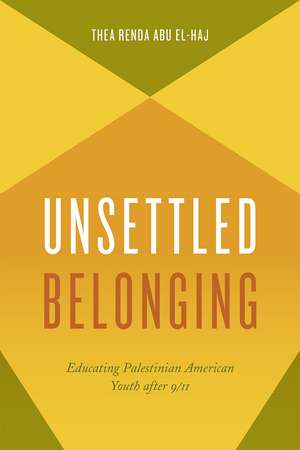Unsettled Belonging: Educating Palestinian American Youth after 9/11
Autor Thea Renda Abu El-Hajen Limba Engleză Paperback – 27 noi 2015
Unsettled Belonging tells the stories of young Palestinian Americans as they navigate and construct lives as American citizens. Following these youth throughout their school days, Thea Abu El-Haj examines citizenship as lived experience, dependent on various social, cultural, and political memberships. For them, she shows, life is characterized by a fundamental schism between their sense of transnational belonging and the exclusionary politics of routine American nationalism that ultimately cast them as impossible subjects.
Abu El-Haj explores the school as the primary site where young people from immigrant communities encounter the central discourses about what it means to be American. She illustrates the complex ways social identities are bound up with questions of belonging and citizenship, and she details the processes through which immigrant youth are racialized via everyday nationalistic practices. Finally, she raises a series of crucial questions about how we educate for active citizenship in contemporary times, when more and more people’s lives are shaped within transnational contexts. A compelling account of post-9/11 immigrant life, Unsettled Belonging is a steadfast look at the disjunctures of modern citizenship.
Abu El-Haj explores the school as the primary site where young people from immigrant communities encounter the central discourses about what it means to be American. She illustrates the complex ways social identities are bound up with questions of belonging and citizenship, and she details the processes through which immigrant youth are racialized via everyday nationalistic practices. Finally, she raises a series of crucial questions about how we educate for active citizenship in contemporary times, when more and more people’s lives are shaped within transnational contexts. A compelling account of post-9/11 immigrant life, Unsettled Belonging is a steadfast look at the disjunctures of modern citizenship.
Preț: 164.55 lei
Preț vechi: 200.45 lei
-18% Nou
Puncte Express: 247
Preț estimativ în valută:
31.49€ • 32.96$ • 26.05£
31.49€ • 32.96$ • 26.05£
Carte indisponibilă temporar
Doresc să fiu notificat când acest titlu va fi disponibil:
Se trimite...
Preluare comenzi: 021 569.72.76
Specificații
ISBN-13: 9780226289465
ISBN-10: 022628946X
Pagini: 264
Ilustrații: 4 halftones
Dimensiuni: 152 x 229 x 18 mm
Greutate: 0.43 kg
Ediția:1
Editura: University of Chicago Press
Colecția University of Chicago Press
ISBN-10: 022628946X
Pagini: 264
Ilustrații: 4 halftones
Dimensiuni: 152 x 229 x 18 mm
Greutate: 0.43 kg
Ediția:1
Editura: University of Chicago Press
Colecția University of Chicago Press
Notă biografică
Thea Abu El-Haj is associate professor of education and an educational anthropologist at Rutgers University. She is the author of Elusive Justice: Wrestling with Difference and Educational Equity in Everyday Practice.
Cuprins
Introduction
Part 1 Belonging and Citizenship
Chapter 1 “Trying to Have an Identity without a Place in the World”
Chapter 2 “We Are Stateless, but We Still Have Rights”
Part 2 “I Know How the Men in Your Country Treat You”: Everyday Nationalism and the Politics of Exclusion
Chapter 3 “The Best Country in the World”: Imagining America in an Age of Empire
Chapter 4 “The Beauty of America Is It’s a Salad Bowl”: Everyday Nationalism at Regional High
Chapter 5 “Are You or Are You Not an American?”: The Politics of Belonging in Everyday Life
Conclusion
Acknowledgments
References
Index
Part 1 Belonging and Citizenship
Chapter 1 “Trying to Have an Identity without a Place in the World”
Chapter 2 “We Are Stateless, but We Still Have Rights”
Part 2 “I Know How the Men in Your Country Treat You”: Everyday Nationalism and the Politics of Exclusion
Chapter 3 “The Best Country in the World”: Imagining America in an Age of Empire
Chapter 4 “The Beauty of America Is It’s a Salad Bowl”: Everyday Nationalism at Regional High
Chapter 5 “Are You or Are You Not an American?”: The Politics of Belonging in Everyday Life
Conclusion
Acknowledgments
References
Index
Recenzii
“Abu El-Haj has spent years working closely with Palestinian American high school students to better understand how they understand themselves. Educators across the nation should pay attention to what she has uncovered. By investigating how schools reproduce a reflexive ‘everyday nationalism’ through their curricula and instruction, Abu El-Haj shows us how Palestinian American students are routinely misunderstood, maligned, and marginalized by faculty, administrators, and other students alike. But she also offers paths to progress in this valuable study. She proposes solutions where education and citizenship work together to alleviate injustice and inequality, both at home and abroad.”
“This inordinately resourceful education text, while focused on the trials in the lives of Palestinian high schoolers since 9/11, is alternatively an examination of globality. In the current matrix of questions surrounding emotional/psychological belonging and physical juridical citizenship/non-citizenship, educational anthropologist Abu El-Haj provides readers with the contours. Immigrant parents from countries in turmoil actively seek to instill in their children a belonging to the ancestral home and its political history and current reality, while they are expected to use opportunities in the United States. Living two lives is a quagmire for these young people. Exploring the United States as a society with its own national imagery, ongoing empire building, and racism, Abu El-Haj addresses a national educational philosophy that is increasingly unable to accomplish the realities of globality. Though there is an acknowledgment of American voices espousing that this is precisely the problem, there is a retreat from giving them equal significance. One major question is how do the radical citizens actually participate in all aspects of a society that provides a cherished set of opportunities that rely on more than juridical citizenship. A must-read for educators and the general public. . . . Essential.”
